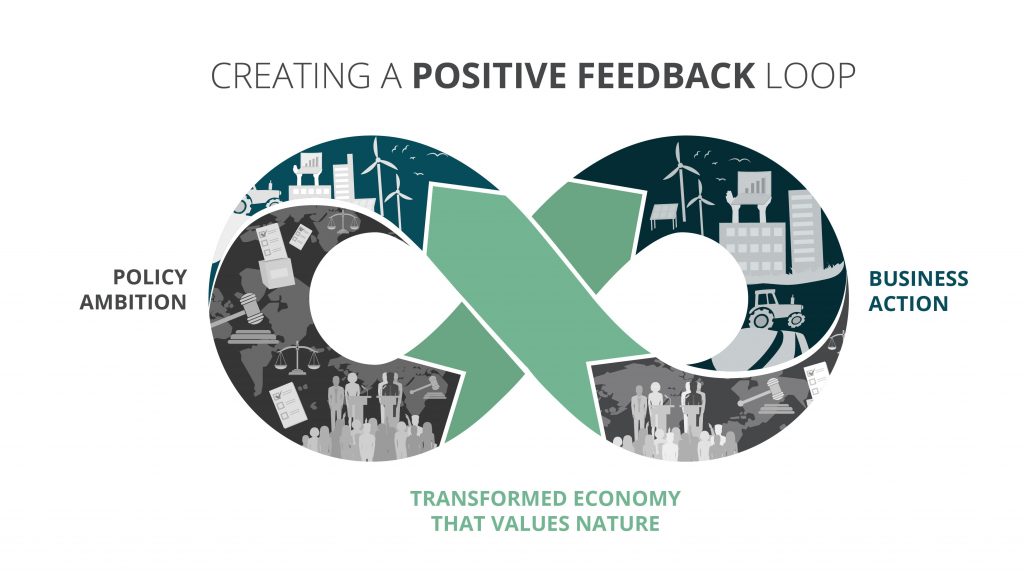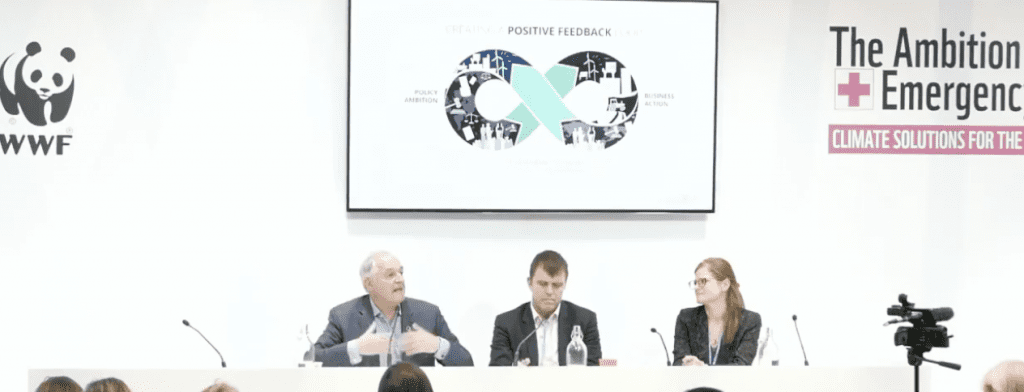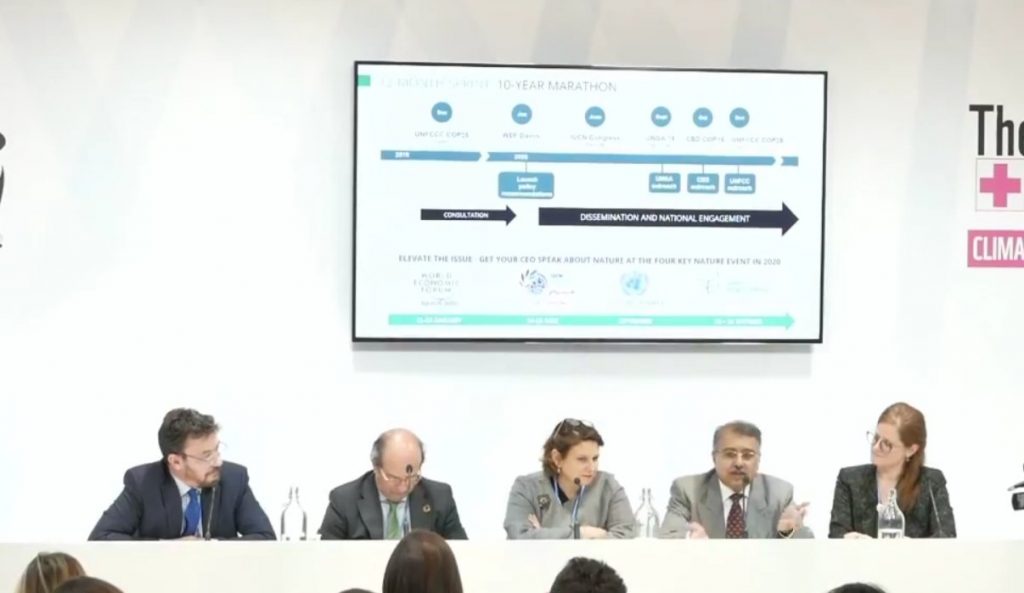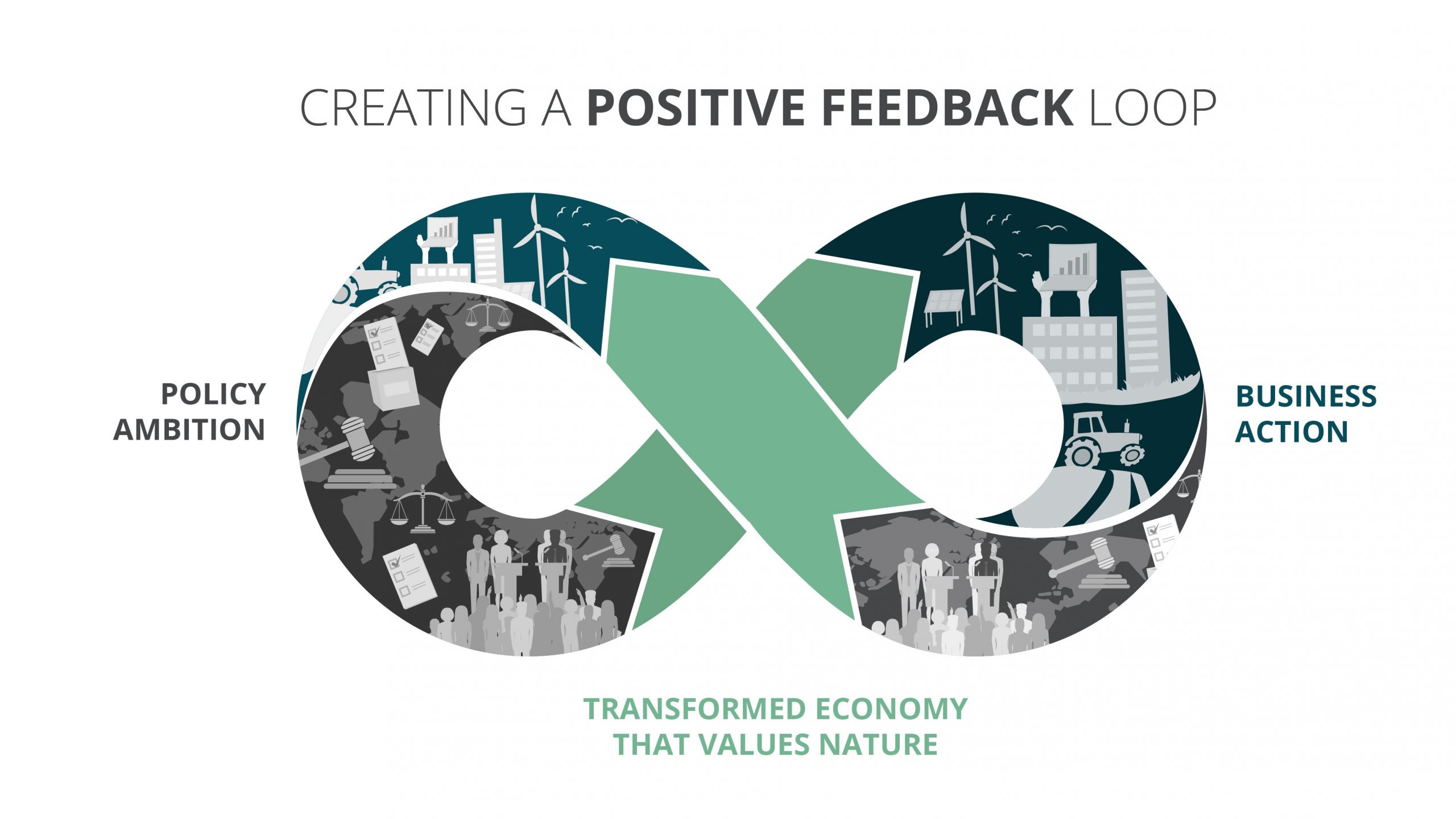


- ,
- , Biodiversity, Climate Change, News
In the framework of COP25 taking place in Madrid the coalition Business for Nature (BfN) organised a side event for representatives from business, governments and civil society to discuss recommendations from private sector to governments to revert loss of biodiversity by 2030 and tackle climate change while ensuring a sustainable development. The set of high level recommendations to feed the 2020 super year of nature emerging from the open survey recently launched and a series of events organised to open the discussion to the largest possible number of actors will be presented at the Davos 2020 Forum.
Eva Zabey, Executive Director of BfN, assured participants gathered at the Panda Hub of WWF that there are two main targets to be addressed:
- We need to transform policy frameworks to be more coherent and provide clear direction.
- We need to transform our economic and financial systems.
Zabey highlighted the need to join forces for nature and promote public-private partnerships. We need to be coherent in the policies for people, nature and climate; and what it does mean is also for businesses in terms of the way businesses deal with multiple issues together.
She also recalled that there is a lot of regulation in place but it is not implemented. She wonder how can we make progress on this. In relation with how to transform economic and financial systems, similarly that “we need to put a price in carbon, we need to put a value on nature. We might not be ready yet to say that we need a price on nature because actually there are lots of questions and things we need to understand about the pricing of it, but certainly we need to value how important nature is for companies”.
A second key point is the need to go beyond GDP. How can we can find success. We need to go beyond GDP and beyond profits and embed nature in every decision that it´s made. How can we do that and why this can happen because nature is more material for companies. Once again, we can learn from climate. Climate is a material issue for businesses. We need to re-direct subsidies and to incentivize companies to invest in innovation, as well as unlock finance for nature.
Zabey clarified that although “recommendations will be high level they will be grounded and tested by different companies around the world, in different geographies and from different sectors. This will give us the strength to be confident also to the policy makers as we adapt the texts in the run up to the COP15 of the Convention of Biological Diversity.
“We need to put a price in carbon, we need to put a value on nature. We might not be ready yet to say that we need a price on nature because actually there are lots of questions and things we need to understand about the pricing of it, but certainly we need to value how important nature is for companies”
Eva Zabey, Executive Director of Business for Nature Coalition
Nature-based solutions
During his intervention in the opening, Nigel Topping, CEO de We Mean Business, said that “the more companies and the more countries that commit to net zero the more interest that we can drive and capitalize to nature-based solutions. The more ambitious we can drive from businesses, cities and countries by 2030 and earlier is better for nature-based solutions.” “If you are in Europe now and you are committed to net zero by 2050 as a company all you are committed to is legal compliance.”
The more companies and the more countries that commit to net zero, the more interest that we can drive and capitalise to nature-based solutions"
Nigel Topping, CEO of We Mean Business,
"It is needed a regenerative thinking on how to restore the planet"
Paul Polman, Imagine and Chair of the International Chamber of Commerce, assured during the Business for Nature session that “nature-based solutions is now more understood as part of the problem that needs to be addressed and that has to be an integrated part of it and it is also better understood of the enormous opportunities. We just issued a report on food and land use that says that assures that every dollar invested is 15 times return.” “We cannot solve climate crisis if we don´t solve the nature crisis which is ultimately a human crisis. This is at the heart of the SDGs and it is a more exciting and a more holistic story than if you talk climate alone.”
Looking into species disappearing, in the last 40 years “we have lost about 60% of vertebrate species and about 1 million of species are at risk of extinction, according to the latest report available. This is a hundred times more than a normal rate. I don´t think we want to be a part of that. We have to reverse that. The rate of deforestation unfortunatelly continuous to be at a too higher level. Every year we lose the size of about the UK in deforestation and that is despite commitments made by 123 countries out of 190+ who signed on deforestation and forest protection during the COP in Paris and none of that is beign well implemented. So we need to make clear that we need to protect our forest. It is 37% of the solution of climate change. Probably they best technology that we have available in human kind is called a tree. Getting back to protecting the forest of our world and our natural resources gets only 1% of the funding and attention basically that is out there while there is an enormous benefit that we can get from it. Nature-based solutions offer $125 trillion a year benefits that we are not accounting for in business models. But if its gone our businesses are gone. There is no business on a death planet.”
He also talked about the need of ambitions which have to be reflected in NDCs. The COP15 CBD 2020 “is an ideal moment for ambition and also the COP26 on climate change need to have more nature-based solutions in there and the Global Deal for Nature is where these all come in fact to get to the higher levels. What I´m asking businesses to do is to make the forces of their governments to transform policies and frameworks. We also need that the financial system understands that this is a very good area to get your finances to flow into. It is part of the development agenda and you can only implement that the same as climate change and nature-based solutions if you can get the financial markets to be interested in that.”
He also mentioned that they are seeing already increasingly businesses around the world that can increase what they call ‘the positive feedback loop’. Where there are countries setting the right policy ambitions they actually get businesses to invest because they see the opportunities. “When you get more business action you get again more courageous policy decisions. That is a perfect feedback loop to capture”. He stated. There are 360 businesses who have already made commitments to reverse the nature loss and restore the planet vital systems. “If earths overshooting day is now July 29th I´d argue that just minimising the damage or less bad is not good enough. Being neutral in these cases is not good enough any more. Companies that are going to survive in the future are the companies that have a regenerative thinking on how to restore the planet and otherwise we are not going to get there. Businesses increasingly understand that. They rely on nature for water, food, fiber, minerals, ecosystems, pollination of crops, water filtration and of course for many people´s livelihoods that ultimately end up to the benefit of businesses. So the more that we can create alliances the better it is.”
In September the Net Zero Alliance got a lot new signatories and there was a big movement for the financial market on divesting their portfolios on carbon-related businesses. It was $2 trillion on carbon-related divesting in September from companies like AXA, Ceres and Alliance, among others. That figure is now $4 trillion. “We see an exponential growth happening in commitments and concrete actions. Article 6 is in the middle of what we need to solve to really get to the ambitions that are beign shared. I like what you are doing here because it brings business together with conservation organisations, progressive companies together with mainstreaming companies and SMEs, and it also brings voices to the table of parts of our planet that unfortunatelly are fundamental for human beigns to be here but for some reason we haven´t given them a voice.”, Polman concluded.
"Companies that are going to survive in the future are the companies that have a regenerative thinking on how to restore the planet"
Paul Polman, Imagine and Chair of the International Chamber of Commerce

Imagen: Business for Nature
"We need a good framework to value ecosystem services"
Alice Durand-Reville, Director of Corporate and Public Affairs at Danone, “what it is important from business is that we can bring solutions, scale and impact if we do things properly. Danone is a food company, we acknowledged four or five years ago that the food system is broken and that we needed a systemic change in order to provide and upscale solutions. For the past 50 years action in agriculture has arrived to an edge where we are also damaging the planet. We are feeding the planet but we are damaging it also.”
“So we need a massive change, a swift in agriculture practices in order to focus on restoration and regeneration practices. What we are doing is to use the power of our supply chain and the power of our connection with consumers to support and drive this massive change from agriculture intensive practices to regenerative ones. For instance, in France we pledged that 100% of our resources by 2025 will come from regenerative agriculture practices and to make them understandable to consumers we are taking them together with us so they see that what they buy has an impact on what the planet looks like. As we can not do this change alone we launched in September along with WWF and Business for Nature a new Coalition called One Planet Business for Biodiversity which aggregates 20 of the biggest agriculture companies (they are present in 120 countries and their joint turnover is about €500 billion) to work together on how to scale up regenerative practices and have a real impact. We are bringing farmers and reviewing our portfolios to reduce the loss of biodiversity and reverse forest deforestation.”
“By June we will disclose a solutions framework and by October in Kunming (China) we´ll deliver individual commitments from these companies. Of course we know this is not enough and we have to do a lot more. What we need is a good framework to value ecosystems services, carbon sequestration and soils by agriculture to help famers transition to scale.”
"We need a massive change, a swift in agriculture practices in order to focus on restoration and regeneration practices." "We need is a good framework to value ecosystems services, carbon sequestration and soils by agriculture to help famers transition to scale.”
Alice Durand-Reville, Director of Corporate and Public Affairs at Danone
"We need China to be a Paris moment with the equivalent to the 2 ºC for nature"
Daniel Calleja, Director General for Environment of the European Commission, claimed that “the Aichi Targets are coming to an end. The last thing we should do is to say that we will not meet them and we extend them to 2030. We need to have a new set of global, concrete and ambitious targets to halt the loss of biodiversity. We need concrete commitments from countries, a monitoring mechanism and appropriate financing. We need China to be a Paris moment with the equivalent to the 2 ºC for nature. In order to do that, today the European Commission has put forward its proposal for a Green Deal to make sure that the four crisis that we are facing: the climate crisis, the biodiversity crisis, the resources crisis —because we are overexploiting our resources— and the pollution crisis are tackled in an comprenhensive way. This means not just actions for governments, but also full involvement from private sector. This means working together and if we do so we can hold biodiversity loss and to put in place a strong agenda for change so that we can survive in this planet.”
"We need China to be a Paris moment with the equivalent to the 2 ºC for nature. In order to do that, today the European Commission has put forward its proposal for a Green Deal to make sure that the four crisis that we are facing: the climate crisis, the biodiversity crisis, the resources crisis because we are overexploiting our resources and the pollution crisis are tackled in an comprenhensive way"
Daniel Calleja, Director General for Environment of the European Commission

"It is necessary to restore balance"
Anirban Ghosh, Chief Sustainability Officer of Mahindra Group: “There is one thing that I think can make 2020 a super year is if we begin to restore the balance. Business must show leadership. Tomorrow I´ll travel back home and usually I´m very happy coming back but this time thanks to the Google simulation in the UNFCC pabillion at the COP25 I feel that I belong to a small land at stake. Because the simulation tells me that with 2 ºC two out of seven buildings in our compound will be under water. And do you know why this is happening? Essentially because we accept the balance. It is not that we haven´t had emissions before but then we had this amazing period when we increased emissions and we destroyed or kept reducing the ability of earth to capture emissions that we made. And this is the unbalance that we cause. In the COPs we usually talk about reducing emissions, which is important, but we don´t talk about restoring the ability of earth of capturing carbon from the air. This is what I think that Business for Nature will help us do. 2020 to be a super year, one statement: restore the balance.”
"In the COPs it is important to talk not only about reducing emissions but speak about restoring the ability of earth of capturing carbon from the air. This is what I think that Business for Nature will help us"
Anirban Ghosh, Chief Sustainability Officer of Mahindra Group
"Biodiversity is as important as climate change"
Stefan Paye, Director of Climate and Environmental Unit of the French Ministry for Foreign Affairs, “private companies and governments are working together to bring the challengest we are facing. Science not only stresses the urgency to act but biodiversity is as important as climate change. Science keeps reminding us how urgent and transformative our actions must be. Business engagement is essential to the French government and governments alone won´t implement the Paris Agreement. Every stakeholder has a piece of the puzzle of the solution to climate change. Business can provide innovative solutions and advocate that they are ready to do the needed ecological transition and immediately engaging decarbonisation paths.”
"Science not only stresses the urgency to act, but highlights that biodiversity is as important as climate change. Science keeps reminding us how urgent and transformative our actions must be"
Stefan Paye, Director of Climate and Environmental Unit of the French Ministry for Foreign Affairs
Share this post
Lorem ipsum dolor sit amet, consectetur adipiscing elit. Ut elit tellus, luctus nec ullamcorper mattis, pulvinar dapibus leo.



No Comments